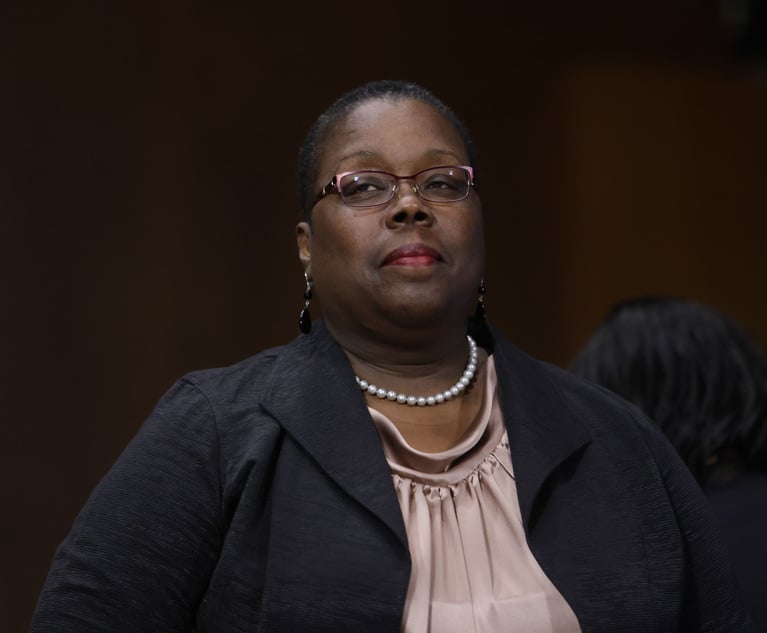 The Supreme Court of Georgia held its first-ever virtual oral arguments with only Chief Justice Melton in the courtroom, with all parties connected via Zoom video, and streamed live, on April 20, 2020.
The Supreme Court of Georgia held its first-ever virtual oral arguments with only Chief Justice Melton in the courtroom, with all parties connected via Zoom video, and streamed live, on April 20, 2020.National Appellate Advocacy Group Issues Best Practices for Remote Oral Arguments
While stressing that in-person argument is best, the American Academy of Appellate Lawyers recommended, to get as close as possible to that experience, that courts choose video arguments whenever possible, as many members expressed "a very strong preference for video arguments" over audio-only sessions.
July 21, 2020 at 01:56 PM
4 minute read
The original version of this story was published on National Law Journal
Video is better than audio. There should be public access. Attorneys should be allowed to have practice sessions, and judges should still wear their robes.
Those are a handful of recommendations that a the American Academy of Appellate Lawyers recently released as part of a list of best practices aimed at helping attorneys, judges and court staff hold oral argument sessions remotely. The suggestions are set to provide guidance to the legal industry as it begins to navigate virtual argument sessions in the wake of the COVID-19 pandemic, which has shut down courtrooms across the country and caused lingering health concerns over in-person court proceedings.
"We wanted to come up with a list of best practices, and we wanted to get those out while this pandemic was affecting the administration of justice across the country," AAAL president Howard Goodfriend said. "They are basically recommendations for courts to enhance and smoothly transition to a remote argument format in the hope that the process would be as similar as possible to in-person argument."
READ THE RECOMMENDATIONS:
|The guidance is based on input from 350 AAAL fellows who practice in every state and all federal courts, and comes from insights gleaned from the various Zoom calls and phone conferences they've held in recent months.
According to Goodfriend, the AAAL, which is focused on advocating for the importance of oral arguments, began looking into developing guidance on remote oral arguments in early April, since many member had recently seen their lists of argument sessions quickly get cancelled as the COVID pandemic swept across the globe. As courts began expanding their online oral argument capabilities, some encountered hiccups that helped provide the group with guidance not only on the simple and easily avoided technological missteps, but also on the subtler issues particular to oral argument sessions, like how judges should be able to engage in cross-talk during the sessions.
"It's a nuts-and-bolts approach," Goodfriend said.
The recommendations cover a range of topics from technology choices courts should make to the ways judges and attorneys should prepare for the sessions. It also provides guidance on how arguments themselves should be conducted to help make the flow of the sessions as close to in-person arguments as possible.
Specifically, the AAAL is recommending courts and parties use land lines and computers with fast and stable connects, courts make technology support personnel available, and courts give counsel detailed descriptions of the process before hand. During arguments, the AAAL further recommends that courts have a method for identifying the speaker, that courts inform attorneys in advance if questioning will be done sequentially, and judges, as well as counsel, try to find a place with a simple, neutral background, rather than using any virtual backdrop.
The AAAL is also recommending that courts choose video arguments whenever possible, as many members expressed "a very strong preference for video arguments" over audio-only sessions.
"The 'cues' that visual interaction brings to an argument are lost when argument is conducted over the phone. And the problem of talking over, or cross-talk, becomes acute," the AAAL said. "That may prompt use of 'rules of transition' from question to argument that make for a stilted flow and use valuable time."
According to Goodfriend, the report is the first step in a three-phase project related to oral argument. Along with the broad guidance released that were recently released, the group plans to provide another report providing more in-depth guidance for lawyers, and then a third report looking further into the future in terms of how remote oral arguments may become a part of the post-COVID legal landscape.
"We encourage appellate courts to review our recommendations and adopt those that suit their unique rules, practices, procedures and resources for more seamless audio, visual and hybrid arguments for the duration of the pandemic and beyond," James Layton, chairman of the AAAL task force that developed the guidance, said in a press release.
This content has been archived. It is available through our partners, LexisNexis® and Bloomberg Law.
To view this content, please continue to their sites.
Not a Lexis Subscriber?
Subscribe Now
Not a Bloomberg Law Subscriber?
Subscribe Now
NOT FOR REPRINT
© 2024 ALM Global, LLC, All Rights Reserved. Request academic re-use from www.copyright.com. All other uses, submit a request to [email protected]. For more information visit Asset & Logo Licensing.
You Might Like
View All

Meet the Pacific Northwest Judges Who Rejected the Kroger-Albertsons Supermarket Merger
4 minute read
Judge's Civil Contempt Order for Zoom Recording Violation Must Include 'The Keys to the Cell,' State Appellate Court Says
4 minute read
Federal Judge Grants FTC Motion Blocking Proposed Kroger-Albertsons Merger
3 minute readTrending Stories
- 1People in the News—Dec. 12, 2024—Pietragallo Gordon, Fox Rothschild
- 2Recent Decisions from the United States District Court for the Eastern District
- 3SoundCloud GC Takes Legal Reins of Condé Nast at Tumultuous Time
- 4When Dealing With Child Abuse Cases, Attorneys Need to Know How Children Perceive Time
- 5Like a Life Raft: Ben Brafman Reflects on Nearly 50 Years as a Defense Attorney
Who Got The Work
Michael G. Bongiorno, Andrew Scott Dulberg and Elizabeth E. Driscoll from Wilmer Cutler Pickering Hale and Dorr have stepped in to represent Symbotic Inc., an A.I.-enabled technology platform that focuses on increasing supply chain efficiency, and other defendants in a pending shareholder derivative lawsuit. The case, filed Oct. 2 in Massachusetts District Court by the Brown Law Firm on behalf of Stephen Austen, accuses certain officers and directors of misleading investors in regard to Symbotic's potential for margin growth by failing to disclose that the company was not equipped to timely deploy its systems or manage expenses through project delays. The case, assigned to U.S. District Judge Nathaniel M. Gorton, is 1:24-cv-12522, Austen v. Cohen et al.
Who Got The Work
Edmund Polubinski and Marie Killmond of Davis Polk & Wardwell have entered appearances for data platform software development company MongoDB and other defendants in a pending shareholder derivative lawsuit. The action, filed Oct. 7 in New York Southern District Court by the Brown Law Firm, accuses the company's directors and/or officers of falsely expressing confidence in the company’s restructuring of its sales incentive plan and downplaying the severity of decreases in its upfront commitments. The case is 1:24-cv-07594, Roy v. Ittycheria et al.
Who Got The Work
Amy O. Bruchs and Kurt F. Ellison of Michael Best & Friedrich have entered appearances for Epic Systems Corp. in a pending employment discrimination lawsuit. The suit was filed Sept. 7 in Wisconsin Western District Court by Levine Eisberner LLC and Siri & Glimstad on behalf of a project manager who claims that he was wrongfully terminated after applying for a religious exemption to the defendant's COVID-19 vaccine mandate. The case, assigned to U.S. Magistrate Judge Anita Marie Boor, is 3:24-cv-00630, Secker, Nathan v. Epic Systems Corporation.
Who Got The Work
David X. Sullivan, Thomas J. Finn and Gregory A. Hall from McCarter & English have entered appearances for Sunrun Installation Services in a pending civil rights lawsuit. The complaint was filed Sept. 4 in Connecticut District Court by attorney Robert M. Berke on behalf of former employee George Edward Steins, who was arrested and charged with employing an unregistered home improvement salesperson. The complaint alleges that had Sunrun informed the Connecticut Department of Consumer Protection that the plaintiff's employment had ended in 2017 and that he no longer held Sunrun's home improvement contractor license, he would not have been hit with charges, which were dismissed in May 2024. The case, assigned to U.S. District Judge Jeffrey A. Meyer, is 3:24-cv-01423, Steins v. Sunrun, Inc. et al.
Who Got The Work
Greenberg Traurig shareholder Joshua L. Raskin has entered an appearance for boohoo.com UK Ltd. in a pending patent infringement lawsuit. The suit, filed Sept. 3 in Texas Eastern District Court by Rozier Hardt McDonough on behalf of Alto Dynamics, asserts five patents related to an online shopping platform. The case, assigned to U.S. District Judge Rodney Gilstrap, is 2:24-cv-00719, Alto Dynamics, LLC v. boohoo.com UK Limited.
Featured Firms
Law Offices of Gary Martin Hays & Associates, P.C.
(470) 294-1674
Law Offices of Mark E. Salomone
(857) 444-6468
Smith & Hassler
(713) 739-1250






